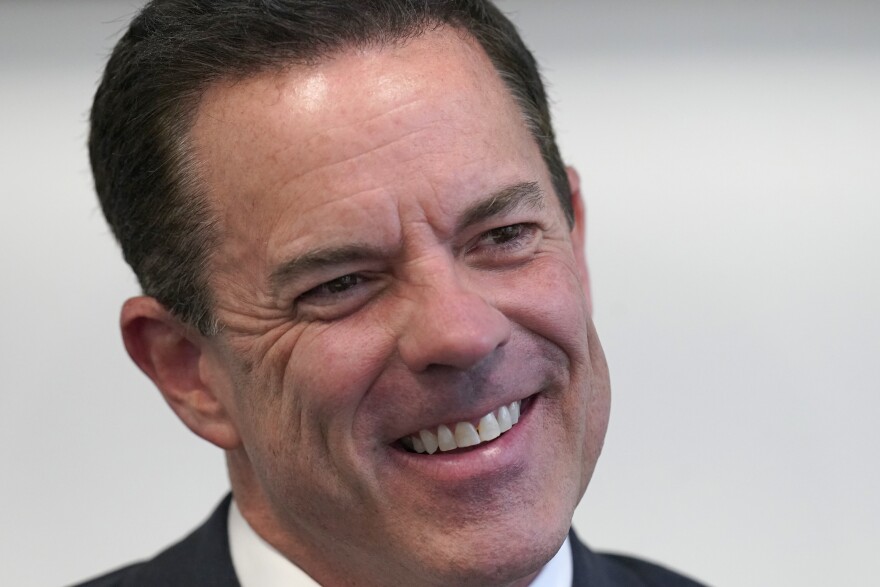
A potential challenger to Republican first-term Sen. Mitt Romney of Utah took a major step Thursday toward jumping into next year's race, expected to be one of the GOP’s hardest-fought primary contests in 2024.
With memories of Romney's two votes to impeach former President Donald Trump still fresh, Utah House Speaker Brad Wilson announced he was forming an exploratory committee for the primary race, which all but formalizes his entry and allows him to raise money and campaign statewide.
Utah needs a “conservative fighter” who represents its values and blamed “professional career politicians” in Washington for inflation and higher gas prices, Wilson told The Associated Press in an interview at his real estate office in northern Utah.
Forming the committee allows him to begin raising contributions and campaign throughout the state.
“I don’t have any illusions that, as speaker of the house, I’m a household name. But that’s really not what this is about. What this is about is me going out and understanding what people care about,” Wilson said.
Romney has not yet announced plans to seek reelection, but earlier this week he filed preliminary paperwork with the Federal Election Commission. He declined to comment on Wilson's announcement.
Wilson's exploratory committee potentially sets up the latest test of Republican Party attitudes toward members willing to criticize Trump after others, such as former Wyoming Rep. Liz Cheney, were punished in GOP primaries or opted not to seek reelection.
Romney, 76, is popular among many in Utah as one of the most prominent members of The Church of Jesus Christ of Latter-day Saints and a person who helped save the 2002 Winter Olympics after a bribery scandal. But the Republican Party’s rightward shift and his stance as an outspoken Trump antagonist has led to questions about his vulnerability and reelection prospects.
The campaign for the June 2024 primary will overlap with the GOP's presidential primary season, and Trump's presence in that race will likely further focus attention on Romney's criticism of the ex-president and the direction he has taken the party.
Romney's willingness to buck his own party has routinely angered GOP activists in Utah and but did little to puncture support for him in his last Senate primary in 2018, when he lost a state party convention ballot but ultimately won with voters in the election itself, by almost 43 percentage points.
Romney has been heckled at airports and narrowly avoided being censured by the state party. And his name has become campaign fodder for right-wing Republicans, who derisively refer to opponents as “Mitt Romney Republicans.”
Wilson told AP on Thursday that his decision to consider a primary challenge has little to do with presidential politics or Romney's impeachment votes. However, he emphasized his background as a native Utahn and his support for Trump to draw a contrast with the Senator, who was born in Michigan, served as governor in Massachusetts and said he didn't vote for Trump in 2016 or 2020.
“I’m going to do what I have done every election cycle: I will vote for the Republican nominee. I have in the past, and I will again. I think that’s what’s best for our country,” Wilson said.
He declined to say whether he intends to support Trump's 2024 bid or seek his endorsement.
Jason Perry, director of the University of Utah’s Hinckley Institute of Politics, said polling shows Romney remains popular with moderate Republicans but less so among conservatives.
In a potential primary, he said, “The space that’s more wide open is to the right.”
Wilson, who grew up with 11 siblings in Kaysville, was first elected to Utah's House in 2010 and has been Speaker his last three terms. Throughout his tenure, he has focused on spurring development, cutting taxes and confronting environmental challenges facing the Great Salt Lake.
He has satisfied party conservatives by supporting restrictions on abortion and transgender youth health care and participation in sports. On other issues he has forged a more moderate path, including changing the name of southern Utah's Dixie State University to Utah Tech University and helping squash a 2020 push to formally rebuke Romney over the impeachment votes.
Like Romney, Wilson has criticized President Joe Biden on government spending and energy policy, calling the Environmental Protection Agency's limits on pollution from power plants an “assault on our energy through rule making."
Though Wilson is the first to launch an exploratory committee, former U.S. Rep. Jason Chaffetz said in February that he was thinking about running. A representative for state Attorney General Sean Reyes has said many were pressuring him to run as well.
Utah’s electorate, though deeply conservative, has not embraced Trump to the extent as other red states. Most Utahns belong to The Church of Jesus Christ of Latter-day Saints, and the state's religion-infused politics mean there is broad support for immigrants and refugees — two groups denigrated by Trump — as well as skepticism for the ex-president's brashness and foul language.
Trump defeated Biden by more than 20 percentage points among Utah voters in 2020, faring better than he did four years prior but still winning less of the electorate than any Republican had since 1996.
Florida Gov. Ron DeSantis is scheduled to speak at the state Republican Party convention later this month.
Perry, the political scientist, said the fact that Romney hasn’t publicly made a decision about running could encourage many candidates to enter, since Senate seats open up so rarely.
“This is a sign of a very interesting election to come,” he said.


